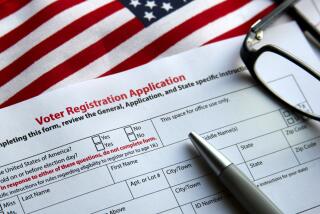Lawmakers Compromise on ‘Motor Voter’ Bill : Congress: Deal would require registration in public assistance offices but impose rules aimed at preventing coercion by welfare workers.
- Share via
WASHINGTON — House and Senate negotiators agreed Wednesday on compromise legislation requiring voter registration at public assistance offices under rules aimed at preventing coercion by welfare workers.
The compromise, which was engineered by Sen. Dave Durenberger (R-Minn.), seemed guaranteed to give Senate Democrats just enough Republican support to head off a renewed GOP filibuster.
“Passage of this measure will open up our democratic process to millions of Americans, and when signed into law by the President, will represent an historic day for democracy in this country,” said Sen. Wendell H. Ford (D-Ky.), the chief Senate negotiator.
“This is a good, strong compromise,” said Becky Cain, president of the League of Women Voters. “It maintains the essential elements of the original bill. American citizens will be the big winners.”
Ford said the House is likely to act on the measure first and that the Senate could easily send the bill to the White House for President Clinton’s signature before the Memorial Day recess.
The new law would make voter registration easier and more widespread than ever before.
Although the agreement is a victory for Clinton, who supported the “motor voter” bill, it also demonstrates that by using the filibuster the Senate’s minority Republicans can shape the contents of bills they have no chance of defeating outright.
“It took a lot of work, but this compromise achieves the goal we all set out to reach--more registered voters and more participation in our political process,” Durenberger said. “In a democracy, more is always better.”
Durenberger worked closely on the issue with members of the House-Senate conference committee but was not a conferee.
A spokesman for Durenberger said the compromise also requires voter registration to be offered at military recruitment offices.
States would be permitted--but not required--to offer registration at unemployment offices.
The core of the bill, the requirement that states offer citizens an opportunity to register to vote when they apply for or renew driver’s licenses, remains unchanged. It also would allow citizens to register by mail.
Under the compromise rules, people applying for public assistance would be asked, in writing, a question similar to this: “If you are not registered, would you like to be registered here today?”
The question is to be followed by a statement that the amount of assistance or benefits will not be affected by how or whether an applicant decides to register.
Arrangements would be made so that the applicant could make the decision in private. A complaint process is also provided for those who believe their registration was coerced.
In the Senate’s earlier consideration of the bill, supporters of the measure were never able to get the 60 votes needed to end a GOP filibuster.
During that debate, many Republicans complained that a requirement that states register voters at public assistance and unemployment offices would give Democrats a definite ballot box advantage.
More to Read
Get the L.A. Times Politics newsletter
Deeply reported insights into legislation, politics and policy from Sacramento, Washington and beyond. In your inbox twice per week.
You may occasionally receive promotional content from the Los Angeles Times.










